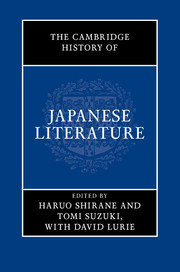Book contents
- The Cambridge History of Japanese Literature
- The Cambridge History of Japanese Literature
- Copyright page
- Contents
- Illustrations
- Contributors
- Book part
- A note on Romanization and conventions
- Glossary
- General introduction
- Part I The ancient period (beginnings to 794)
- 1 Introduction: writing, literacy, and the origins of Japanese literature
- 2 Myth and history in theKojiki, Nihon shoki, and related works
- 3 Songs of the Records and Chronicles
- 4 Fudoki gazetteers
- 5 Man’yōshū
- 6 Anthologization and Sino-Japanese literature:Kaifūsōand the three imperial anthologies
- Part II The Heian period (794–1185)
- Part III The medieval period (1185–1600)
- Part IV The Edo period (1600–1867)
- Part V The modern period (1868 to present)
- Bibliography of English secondary sources and translations
- Index
6 - Anthologization and Sino-Japanese literature:Kaifūsōand the three imperial anthologies
from Part I - The ancient period (beginnings to 794)
Published online by Cambridge University Press: 05 January 2016
- The Cambridge History of Japanese Literature
- The Cambridge History of Japanese Literature
- Copyright page
- Contents
- Illustrations
- Contributors
- Book part
- A note on Romanization and conventions
- Glossary
- General introduction
- Part I The ancient period (beginnings to 794)
- 1 Introduction: writing, literacy, and the origins of Japanese literature
- 2 Myth and history in theKojiki, Nihon shoki, and related works
- 3 Songs of the Records and Chronicles
- 4 Fudoki gazetteers
- 5 Man’yōshū
- 6 Anthologization and Sino-Japanese literature:Kaifūsōand the three imperial anthologies
- Part II The Heian period (794–1185)
- Part III The medieval period (1185–1600)
- Part IV The Edo period (1600–1867)
- Part V The modern period (1868 to present)
- Bibliography of English secondary sources and translations
- Index
Summary
- Type
- Chapter
- Information
- The Cambridge History of Japanese Literature , pp. 86 - 92Publisher: Cambridge University PressPrint publication year: 2015



